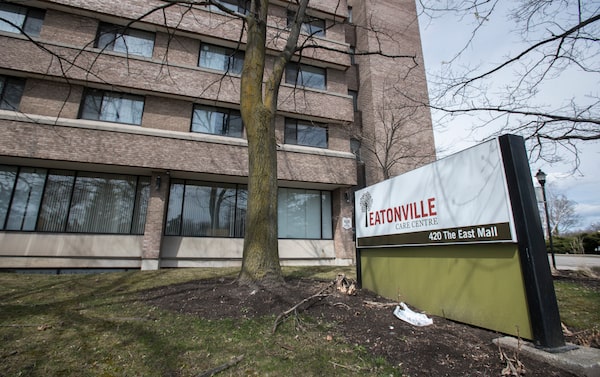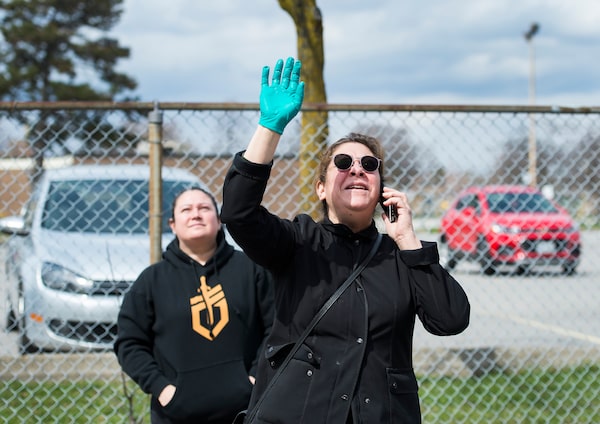
The Eatonville Care Centre in Toronto, is photographed on April 13 2020. Over twenty residents have died in the long term care facility.Fred Lum/The Globe and Mail
The Ontario government is facing calls to take over operations at two of the hardest hit long-term care homes in the province, where at least 54 residents have died and 149 people have been sickened by COVID-19.
The situation at the two homes – Eatonville Care Centre in Toronto and Anson Place Care Centre in Hagersville – is out of control, said Sharleen Stewart, president of the Services Employees International Union Healthcare (SEIU Healthcare), which represents 25,000 workers.
“It’s like sending people into war and they can’t see where the bullets are coming from,” she said. “It’s totally mismanaged and reckless.”
Being worried, even scared, in these circumstances is totally understandable. Looking out for your mental, as well as physical, health is important, but the physical distancing required to protect others from the coronavirus can create a “cocoon” of isolation that makes self-care difficult.
What can you do? We asked experts for advice:
- Keep a routine: Give yourself structure. Eat healthy, stay active and get plenty of sleep.
- Keep things in perspective: Remind yourself that most people experience mild illness and this will come to an end. Avoid going down internet rabbit holes.
- When and where to seek help: Feeling very irritable, snapping at others and having a hard time sleeping are signs you are not able to cope on your own. CAMH and the Canadian Psychological Association have resources to recognize that behaviour and adapt. The Globe also has a guide to what services are available and how to protect your mental health.
How should both employers and employees manage the psychological impact of self-quarantine? One fully remote company shares lessons on staying mentally fit:
- Communication: Remote teams can’t rely on body language. Any way you can help your staff feel involved and connected organically is a win.
- Check-ins: There’s enormous value in discussing morale, mental health and social wellness.
- Social distance – not isolation: Start traditions. Remote teams need things to look forward to and opportunities to connect in stress-free ways.
You can also read The Globe and Mail’s digest of the latest news about COVID-19′s spread around the world and sign up for the Coronavirus Update newsletter.
She said the staff, who are primarily women, have still not been provided with respirator masks, despite repeated requests. She said proper sanitation practices are not being followed and management isn’t being transparent about what is going on. She called on Premier Doug Ford’s government to take over, as British Columbia and Quebec have done in some nursing homes.
But Minister of Long-Term Care Merrilee Fullerton dismissed the request on Friday.
“Other provinces do things differently than Ontario,” she said. “The Ministry of Long-Term Care does not operate homes, but we will assist where other companies need to come in and provide resources and support for struggling homes.”
Canadian patients needed for COVID-19 clinical trials
Quebec’s long-term care crisis started long before the coronavirus pandemic
Across Ontario, one in six long-term care homes have declared outbreaks, leaving 217 residents dead and another 1,229 sickened with the disease as of Thursday. In Toronto alone, two of every three deaths in the city were in long-term care or retirement homes, according to an update posted on the city’s website. As of Friday, 43 homes had declared outbreaks and 106 residents had died.
As of Friday, Eatonville, a 247-bed facility in Etobicoke, on Toronto’s west side, had 79 cases and 32 deaths. The devastation has been more pronounced at Anson Place Care Centre, a 101-bed long-term care and retirement home in the small community of Hagersville, about 100 kilometres west of Toronto.
A staggering 70 per cent of its residents had tested positive for the disease as of Thursday – 49 in the long-term care home and another 21 in the retirement home. Anson announced late Friday night that another three residents had died, bringing the toll to 22.
The Haldimand-Norfolk Health Unit has been called in to help staff the Anson Place long-term care home in Hagersville.Glenn Lowson/The Globe and Mail
Rebecca Piironen, a personal support worker at Anson Place, described the atmosphere as “chaos.” Ms. Piironen fell ill and has been off work since March 22, but has tested negative for COVID-19. She said she still talks to fellow staff members regularly.
"It’s heartbreaking,” Ms. Piironen said. “A few weeks ago these people were smiling and living, and now they’re all dead.”
According to registration records, Eatonville, Anson Place and a third home, Hawthorne Place Care Centre in North York, are owned by Rykka Care Centres, the licence-holder for 11 for-profit long-term care homes in Ontario. Corporate records list Ben Friedman and Sy Schachner as directors. Messages at their homes were not returned Friday.
The Ontario Nurses Association (ONA) sought a court order on Friday compelling the three homes to comply with provincial infection control and health and safety standards. The ONA accuses the homes of keeping residents sickened with the disease among the healthy, causing the virus to spread, according to documents filed in Ontario Superior Court of Justice. The ONA also alleges that the homes “severely limited” staff members’ access to proper protective equipment, including N95 respirators, by locking up the equipment and actively dissuading nurses from using them.
A court hearing is scheduled for next Wednesday.
Anson Place long-term care home in Hagersville on April 6, 2020.Glenn Lowson/The Globe and Mail
Responsive Group, a company affiliated with Rykka, said in an e-mailed statement that the three homes have been working closely with local public health units, “to ensure we are doing everything we can to protect our residents and our staff.” Spokeswoman Nicola Major said all staff and residents at Anson Place have been tested for COVID-19, and the company is working with public health to test everyone at Eatonville and Hawthorne Place. The statement did not reference any specific allegations.
“Throughout this fight, we have had all the personal protective equipment we have needed to follow the very specific directives from Public Health to protect staff and work to prevent further spread of the virus,” she said. Ontario’s Chief Medical Officer of Health only required surgical masks for all long-term care staff last week.
The Ontario government has broad powers to appoint new management at a long-term care home or, in extreme cases, seize its operating licence. Under the provincial Long-Term Care Homes Act, the government can order a facility that is not properly managed to retain, at its expense, new leadership.
Ninety five-year-old Alicia Tamayo waves at her daughter, Betty Fernandez, and granddaughter, Romina Varella at Eatonville Care Centre in Toronto, April 14, 2020.CARLOS OSORIO/Reuters

Betty Fernandez waves to her 95-year-old mother Alicia Tamayo 95 at the Eatonville Care Centre, in Toronto on Tuesday, April 14, 2020.Nathan Denette/The Canadian Press
The minister responsible for long-term care homes may also make an order suspending a facility’s licence if there are “reasonable grounds” to believe that a residence is operating in “a manner that is prejudicial to the health, safety or welfare of its residents,” the act says.
These powers have been used in the past. In 2017, the then Liberal government brought in new management at a nursing home in Sault Ste. Marie.
Meanwhile, a Toronto personal support worker, Christine Mandegarian, died on Thursday after contracting COVID-19. The mother of two worked at Sienna Altamont Care Community in Scarborough, on Toronto’s east side, for 31 years.
In addition, 16 residents of the home who tested positive for COVID-19 have died. Another 63 residents have COVID-19 in addition to 21 staff. One staff member is in hospital.
A personal support worker at the home, whom The Globe is not identifying because she was not authorized to speak publicly, said Ms. Mandegarian’s death has left the other staff reeling. She said management did not initially restrict staff to work in certain areas of the facility to prevent the virus from spreading throughout the home.
A spokeswoman for Sienna Senior Living, Natalie Gokchenian, said management “has implemented all precautions and directives (some before they were mandated provincially).”
With reports from Tom Cardoso, Jill Mahoney and Rick Cash in Toronto
Our Morning Update and Evening Update newsletters are written by Globe editors, giving you a concise summary of the day’s most important headlines. Sign up today.